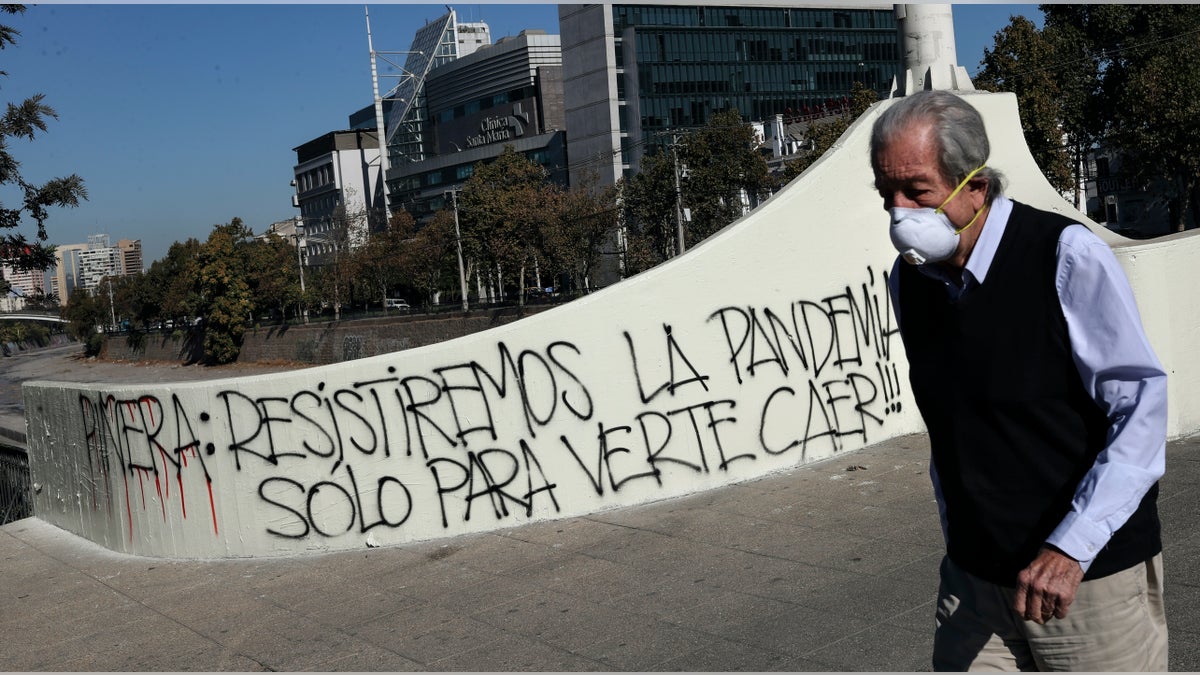FDA clears first saliva test to diagnose coronavirus
Insight from Fox News medical contributor Dr. Marc Siegel.
Get all the latest news on coronavirus and more delivered daily to your inbox. Sign up here.
Health officials in Chile raised some eyebrows this week when they revealed that the country’s coronavirus death toll tally might be inaccurate because it includes people who have recovered.
Health Minister Jaime Mañalich said at a press conference Monday they are counting victims of COVID-19 among the country’s recovered population because they are “no longer contagious.”
“We have 898 patients who are no longer contagious, who are not a source of contagion for others and we included them as recovered,” Mañalich said, according to La Vanguardia. “These are the people who have completed 14 days of diagnosis or who unfortunately have passed away.”
CLICK HERE FOR FULL CORONAVIRUS COVERAGE

A man wearing a face mask walks past graffiti against Chilean President Sebastian Piñera that reads in Spanish "Piñera, we will resist the pandemic just to see you fall!," amid the spread of the new coronavirus in Santiago, Chile, Monday, April 6, 2020. (AP Photo/Esteban Felix)
According to Johns Hopkins University, Chile has recorded at least 7,917 positive coronavirus cases and at least 92 deaths. It did not have a record of how many people have recovered from the virus.
Chilean officials said this way of accounting their figures was adopted from the recommendation of “international experts,” La Vanguardia reported.
The South American country has implemented a nightly curfew at 10 p.m. and has suspended schools until at least May. Its borders and non-essential businesses are closed, however, the government has avoided ordering a stay-at-home order nationwide. Instead, they have supported a “selective quarantine” for parts of the country.
Neighbors Argentina, Colombia and Peru have implemented nationwide quarantine orders in an effort to curb the virus’ spread.
CHRIST THE REDEEMER PAYS TRIBUTE TO CORONAVIRUS DOCTORS, NURSES
On Monday, Mañalich said “prudence and wisdom” was needed when enforcing any type of quarantine.
“Quarantining a place where various people live in a few square meters is not only a sacrifice that generates enormous trauma and health risks, especially for mental health and intro-family violence, it is a tool that produces a shift of such magnitude in people’s freedom of movement that it has to be used with great care, prudence, and wisdom,” he said.
According to Johns Hopkins University’s tally, Chile is the third-most affected country in South America, following Brazil and Peru.
Brazil is by far the most affected by the virus with at least 25,758 positive cases and 1,552 deaths. Peru has recorded at least 10,303 cases and 230 deaths.
The other two countries with more than 2,000 cases are Ecuador and Argentina.









































